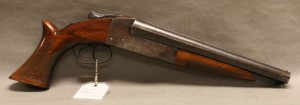What is a Special Occupational Tax?
A Special Occupational Tax (S.O.T.) is a federal tax imposed by Title 26 U.S.C., Chapter 53 (Internal Revenue Code) – National Firearms Act (NFA). Payment of S.O.T. is required by persons engaged in specific elements of the firearms business. Not all FFL holders are required to pay a S.O.T. If a Federal Firearms Licensee (FFL) is engaged in the manufacturing, importation, or dealing in “firearms” as defined by the National Firearms ACT (NFA), they’re required to pay the S.O.T. The tax is due yearly on July 1 or before, and upon initially engaging in the taxable activity.
[magicactionbox id=2965]
What Type Of Firearms Are Included In The NFA?
The word “firearm” has a different definition under the National Firearms Act. When referring to a firearm, one should be careful and understand different rules apply under the NFA. In general, the following type of firearms could be regulated under the NFA if they meet certain criteria:
Shotgun
Rifle
Machine Gun
Silencer
These are the basic categories. For a detailed explanation, consult 26 U.S.C. Chapter 53 (NFA) and 27 CFR 479.
Requirements of the NFA may not apply to firearms determined to be antiques by other definitions in the law.
The NFA also regulates a broad category called “Any Other Weapon” (AOW), which includes pen guns and some “smooth bore” type handguns. Do some research into this category and you’ll be amazed at what you’ll find qualifies as a AOW.
How Can I Become A NFA Dealer?
Qualify as a “Dealer” under the Gun Control Act (GCA) as required by 18 U.S.C §926 and pay the S.O.T. required to deal in NFA firearms ($500.00). A Federal Firearms Licensee (FFL) and other qualified persons can otherwise possess NFA designated firearms, but FFL’s pay the S.O.T if a the FFL is a “Dealer” . Applicants must complete and file the ATF F 7, pay the appropriate licensing fee and not be prohibited from possessing firearms; these are the basic requirements. Having a proper business premises and meeting State/local requirements are key elements of qualifying as a FFL as well. Dealers under the NFA must pay the required tax yearly no later than July 1st in order to remain qualified as a NFA dealer.
Let us help you get your FFL.
This is a Service – Not a FFL kit.
Free Consultation from a former ATF Investigator – 12 Years with ATF
No charge for disabled Vets
Toll Free: 1-800-932-1979
What is a Class 3 S.O.T.?
There’s some confusion about the term “Class 3” and it’s proper use and definition. There’s is no “Class 3 License” that a person can be issued in order to engage as a dealer, manufacturer or importer of NFA firearms. The term refers to the tax liability, a “Special Occupational Tax” (S.O.T.) incurred by a person who engages in these activities. The tax is payable yearly on every “place of business” which conducts business in NFA firearms. The “Class 3” tax is $500 per year for a dealer in firearms (Type 01). This is the most common type S.O.T. paid by persons engaged in the firearms business. Refer to 27 CFR §479 for applicable regulations under the National Firearms Act (NFA).
Are there special records requirements for NFA firearms?
All firearms acquired and disposed by a federal licensee (FFL) must be logged into a permanent record of acquisition and disposition in accordance with 27 CFR part 478, including firearms regulated under the NFA. Although other documents are retained showing ownership and location of the NFA firearms, the FFL must also make appropriate entries into a permanent record of acquisition and disposition. All records pertaining to the ownership and location of NFA firearms must be retained at the licensed premises.
ATF maintains a “registry” firearms classified as NFA firearms not under the control of the United States. The National Firearms Registration and Transfer Record (NFRTR) is a central registry containing firearms identifiers and the name of the registrant. State and local police departments are required to have any NFA firearms in their possession registered in the NFRTR. Machine guns and other firearms regulated under the NFA may be considered “contraband” and subject to seizure if not lawfully registered.

